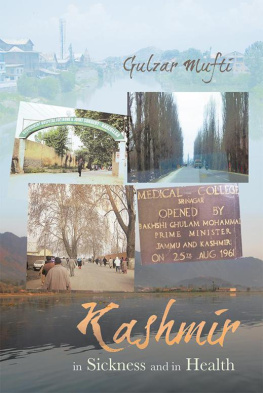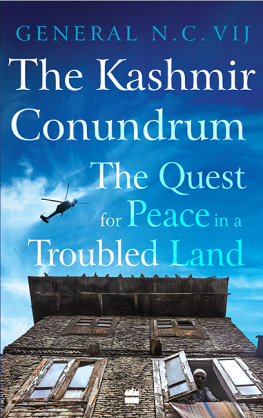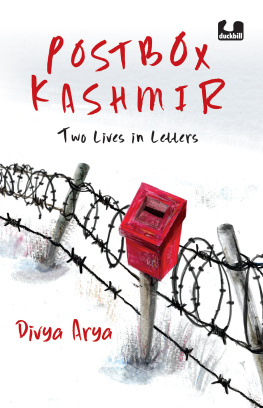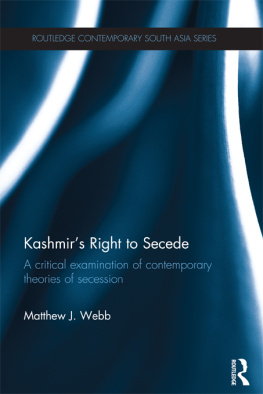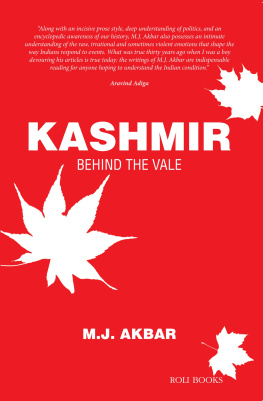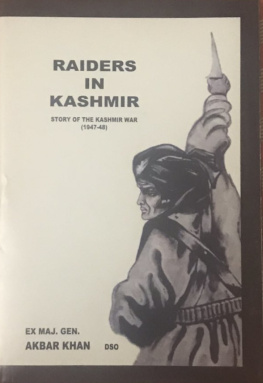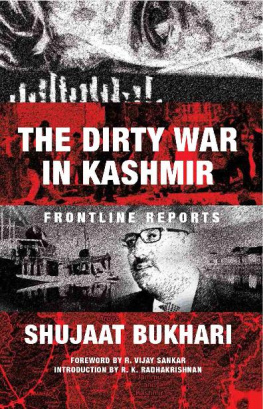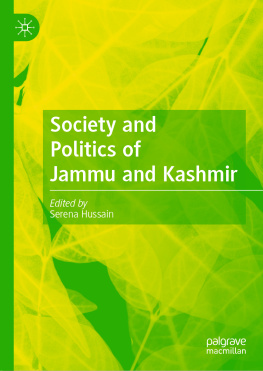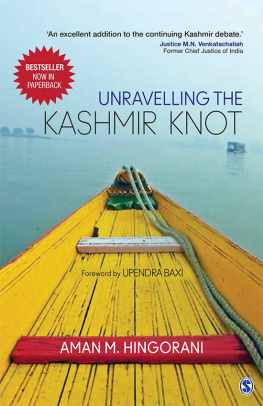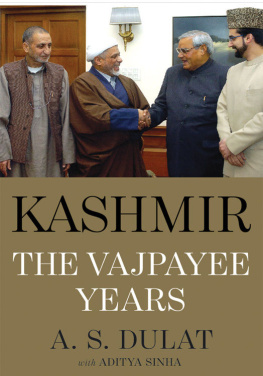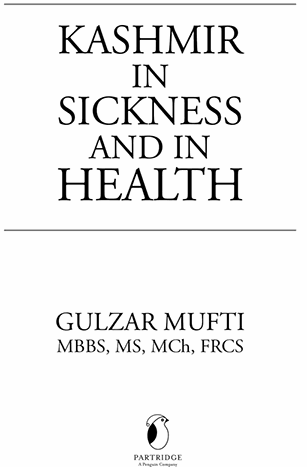
Copyright 2013 by Gulzar Mufti.
ISBN: | Hardcover | 978-1-4828-1000-4 |
Softcover | 978-1-4828-0999-2 |
Ebook | 978-1-4828-0998-5 |
All rights reserved. No part of this book may be used or reproduced by any means, graphic, electronic, or mechanical, including photocopying, recording, taping or by any information storage retrieval system without the written permission of the publisher except in the case of brief quotations embodied in critical articles and reviews.
Because of the dynamic nature of the Internet, any web addresses or links contained in this book may have changed since publication and may no longer be valid. The views expressed in this work are solely those of the author and do not necessarily reflect the views of the publisher, and the publisher hereby disclaims any responsibility for them.
Partridge books may be ordered through booksellers or by contacting:
Partridge India
Penguin Books India Pvt.Ltd
11, Community Centre, Panchsheel Park, New Delhi 110017
India
Phone: 000.800.10062.62
CONTENTS

To my wife and soul mate Razia for the wonderful times we have spent togethercried together, laughed together, and all the times in between. Hundreds of hours of time spent on researching and writing this book actually belonged to her.
To the memory of Moji (my grandma), who taught me the meaning of love. She gave me everything I asked, without asking for anything in return.
To all Kashmiri youngsters on whose shoulders rests
the future destiny of this land.

Our Lives begin to end the day we become
silent about things that matter
(Martin Luther King)
I would like to express my gratitude to the many people who saw me through this book; to all those who provided support, talked things over, and assisted in the editing and proof-reading.
The idea began with my publication of a couple of articles in the Kashmiri English Daily Greater Kashmir , a few years ago. Following that, Dr Muhammad Farooq Ahmad Kaloo, Ex-Director Animal Husbandry, Jammu and Kashmir and Mr Arshad Hussain Kaloo, Senior Editor Greater Kashmir, encouraged me to compile the project in a book form, for which I am grateful to both of them.
I would like to thank Kashmiri historians, Mr Fida Hassnain and Late Dr Mohammad Ishaq Khan for their guidance during the preparation of the manuscript, and to Kashmiri writer, philosopher and judge, Mr Ghulam Nabi Gauhar for his pat on the back.
Thanks are due to the staff at the Directorate of Archives at Srinagar for helping me with the search of old recordsthe Jammu and Kashmir Government Gazette and Annual Administration Reports (AAR), and to Mr Mufti Bashir Ahmed for painstakingly photocopying each of these and forwarding to me. I am also thankful to Prof Girja Dhar for allowing me access to her research material and to Prof Pirzada Abdul Rasheed for sharing his memories with me.
I wish to acknowledge Sister Elizabeth Kurien, Administrator, St Joseph Hospital Baramulla for providing the details about the history of the hospital, Mr Muhammad Amin ex-Administrative Officer, Sher-i-Kashmir Institute of Medical Sciences for procuring the papers regarding the historical background of the Institute, and Dr Mohammed Ashraf Khan, ex-Medical Superintendent for providing a copy of his write up about Jawahar Lal Nehru Memorial Hospital Rainawari, Srinagar. I am grateful to Mrs Jean Din for filling in the gaps in my knowledge about the life of Dr G M Din, and to Syed Altaf-ur-Rehman who supplied Dr Dins 1930s photograph.
I am obliged to Mr Ken Osborne from the Knowledge & Archives Management, Christian Mission Society, Crowther Centre, Oxford, United Kingdom for supplying the photographs of Doctors Elmslie, Arthur Neve and Ernest Neve, to Mr Habib Naqash for permission to use one of the photographs from his collection, and to Cartographic Section, Department of Field Support, United Nations for allowing to include UN Map No. 3953.
My sons and advisors Arjmand and Iqbal have been the greatest source of encouragement with this project. Their unwavering love and faith in me has been the driving force of my life.
Finally, my heart felt thanks to my loving parents, Abbajan and Tataji, who taught me to stand upright in good times and bad times and to believe that anything was possible in life, and to my family without whose love and support nothing would have been possible in my life.
Name | Status | From | To |
DOGRA RULE (State of Jammu and Kashmir) |
Gulab Singh | King (Maharaja) | 09/11/1846 | 30/06/1857 |
Ranbir Singh | King (Maharaja) | 30/06/1857 | 12/09/1885 |
Pratap Singh | King (Maharaja) | 12/09/1885 | 07/09/1925 |
Hari Singh | King (Maharaja) | 14/10/1925 | 16/10/1947 |
POST PARTITION (Indian Administered Kashmir) |
Mehr Chand Mahajan | Prime Minister | 15/10/1947 | 05/03/1948 |
Sheikh Mohammed Abdullah | Prime Minister | 05/03/1948 | 09/08/1953 |
Bakshi Ghulam Mohammad | Prime Minister | 09/08/1953 | 12/10/1963 |
Khwaja Shamsuddin | Prime Minister | 12/10/1963 | 29/02/1964 |
Ghulam Mohammed Sadiq | Prime Minister | 29/02/1964 | 30/03/1965 |
Ghulam Mohammed Sadiq | Chief Minister | 30/03/1965 | 12/12/1971 |
Syed Mir Qasim | Chief Minister | 12/12/1971 | 25/02/1975 |
Sheikh Mohammed Abdullah | Chief Minister | 25/02/1975 | 26/03/1977 |
Presidents Rule | 26/03/1977 | 09/07/1977 |
Sheikh Mohammed Abdullah | Chief Minister | 09/07/1977 | 08/09/1982 |
Farooq Abdullah | Chief Minister | 08/09/1982 | 02/07/1984 |
Ghulam Mohammad Shah | Chief Minister | 02/07/1984 | 06/03/1986 |
Presidents Rule | 06/03/1986 | 07/11/1986 |
Farooq Abdullah | Chief Minister | 07/11/1986 | 19/01/1990 |
Presidents Rule | 19/01/1990 | 09/10/1996 |
Farooq Abdullah | Chief Minister | 09/10/1996 | 18/10/2002 |
Presidents Rule | 18/10/2002 | 02/11/2002 |
Mufti Mohammad Sayeed | Chief Minister | 02/11/2002 | 02/11/2005 |
Ghulam Nabi Azad | Chief Minister | 02/11/2005 | 11/07/2008 |
Presidents Rule |
Next page
